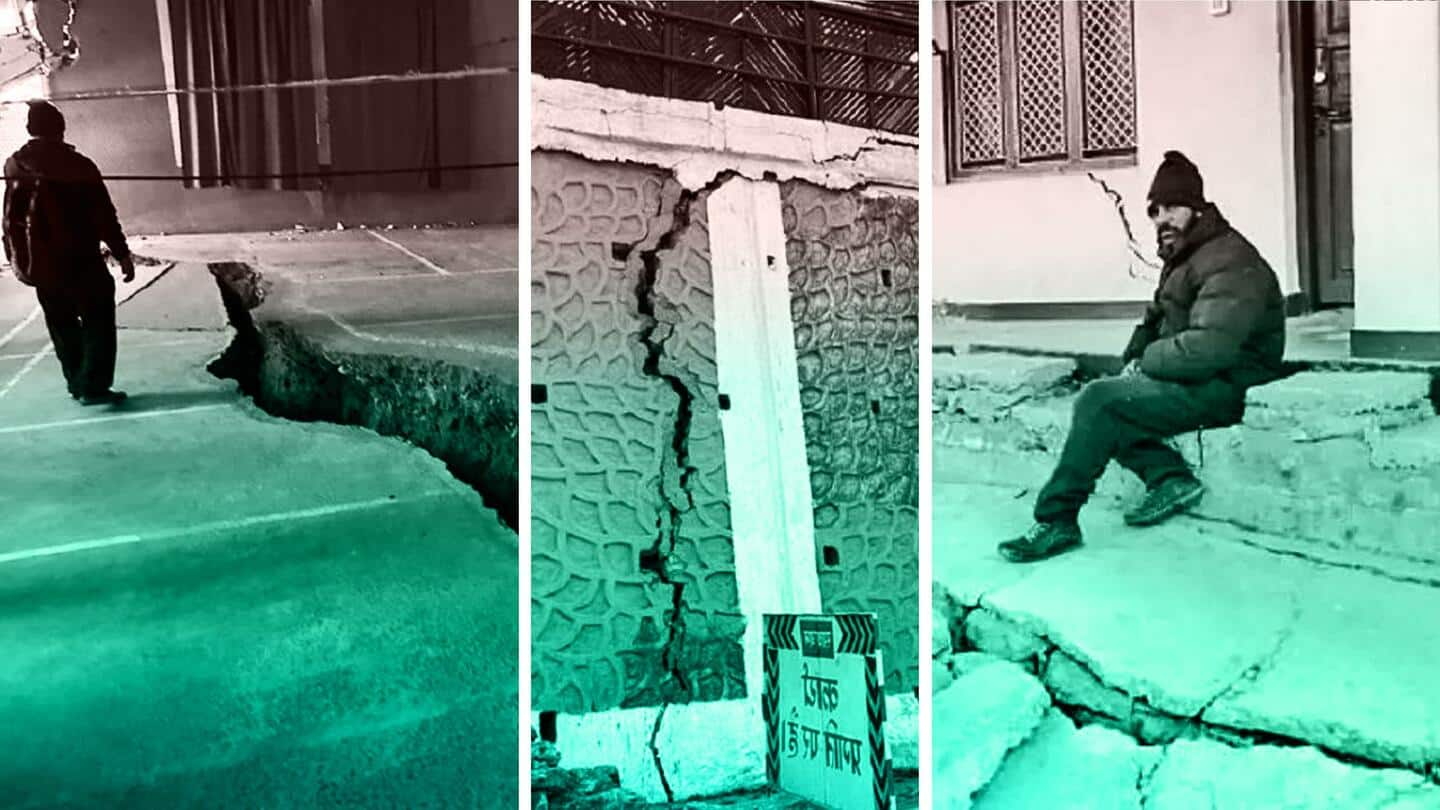
#NewsBytesExplainer: Joshimath land-sinking crisis that's keeping Uttarakhand government on tenterhooks
What's the story
Landslides in Joshimath town of Uttarakhand's Chamoli district have kept the authorities on tenterhooks, with over 600 families contemplating relocation due to cracks in their houses, as well as many roads, caused by land subsidence. Experts believe the issue has been building up for many years due to a variety of manmade and natural reasons. Here's everything to know about the land-sinking crisis.
Context
Why does this story matter?
Joshimath is a town in the Himalayas and is popular for its various trekking routes. It is also a major attraction for pilgrims and tourists, which resulted in the massive expansion of infrastructure over the years. However, the geographical stability of the town has been in question. In fact, in 2022, a Supreme Court-appointed commission revealed that Joshimath was built on an unstable foundation.
Details
Current situation in 'sinking town'
The Uttarakhand government has begun evacuating nearly 600 families from danger zones in Joshimath after several land-sinking incidents were reported. Chief Minister Pushkar Singh Dhami, who inspected the affected areas on Saturday, has directed officials to relocate affected families to safer shelters. Reportedly, choppers have also been put on standby and will be pressed into service by disaster response teams as per requirement.
About
Phenomenon of land subsidence in Joshimath
Land sinking in Joshimath is caused by a phenomenon called land subsidence, which refers to the vertical downward movement of the earth's surface. Located at an altitude of over 6,000ft, Joshimath falls in the most earthquake-prone Seismic Zone 5. Notably, a geological survey by Mishra Committee in 1976 also warned of environmental damages in Joshimath due to hillside blasting and construction by removing boulders.
Experts speak
Experts say phenomenon not new, going on for years
The land-sinking phenomenon in Joshimath has been going on for years, Kalachand Sain, director of the Dehradun-based Wadia Institute of Himalayan Geology, told PTI. The major three causes, according to him, are the town's vulnerable foundations since it was built a century ago on landslide debris, its location in Seismic Zone 5, and water percolation, which lowers the cohesive strength of the rocks.
Quote
Anthropogenic also factors responsible for Joshimath crisis
"Hotels and restaurants have mushroomed everywhere. The pressure of population and the size of the crowd of tourists has also increased manifold," Sain said, adding that many houses in the town won't survive, so people must be relocated to safer locations.
Comments
Joshimath's soil not ideal for large constructions: Glaciologist
The Indian Express quoted DP Dobhal, a leading glaciologist, as saying that the Joshimath region was formerly under glaciers, and the soil is thus unsuitable for large constructions. The problem was exacerbated by the region's recurrent earthquakes, he added. His views were corroborated by Uttarakhand State Disaster Management Authority's (USDMA) 2022 study, which said Joshimath was highly vulnerable to sinking due to tectonic activity.
Allegations
NTPC, government accused of ignoring warnings
The people of Joshimath have been blaming the National Thermal Power Corporation's (NTPC) Tapovan-Vishnugad hydel project for the crisis. The construction of the project, despite opposition from the people, has led to strong resentment against the Uttarakhand government, too, for its alleged indifference toward the issue. They also accused the NTPC and the government of ignoring repeated warnings by environmentalists about the dangerous situation.
Steps
Strategy to deal with the situation
Sain said a long-term response strategy to tackle the crisis should include a thorough microzonation plan and risk identification. He stated previous analyses suggested that all activities need to be closely monitored. "It is possible that some areas are found to be no longer safe for human settlements. But the bottom line is that a business-as-usual scenario is just too dangerous now," he said.
Plea
Matter again reaches Supreme Court through PIL
Meanwhile, a public interest litigation (PIL) has been filed in the Supreme Court, requesting that the current land-sinking incidents in Joshimath be declared a national disaster and that the affected families be compensated. The PIL filed by religious leader Swami Avimukteshwaranand Saraswati sought direction from the Centre and the National Disaster Management Authority (NDMA) to provide immediate help to the people.